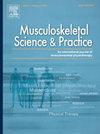Determinants of sleep quality in individuals with musculoskeletal pain and its effects on fatigue, attention, cognition, and physical performance
IF 2.2
3区 医学
Q1 REHABILITATION
引用次数: 0
Abstract
Purpose
Sleep is a necessity to maintain many vital functions. Sleep disorders can result in negative consequences such as fatigue, drowsiness, and decreased neurocognitive performance. This study aimed to explore sleep quality determinants in individuals with musculoskeletal pain and assess its impact on fatigue, physical performance, attention, and cognition.
Methods
The study involved 65 patients aged 40–65 years. Sleep quality, pain severity, physical activity levels, anxiety and depression levels, rumination, fatigue levels, attention levels, cognitive levels and physical performance were evaluated with reliable scales.
Results
Pain intensity during activity (r:0.270, p < 0.05), anxiety (r:0.521, p < 0.05), depression (r:0.484, p < 0.005), rumination (r:0.365, p < 0.05), fatigue (r:0.380, p < 0.05), attention (r:0.253, p < 0.05), and cognition (r: 0.279, p < 0.05) were found to be the factors associated with sleep quality. Anxiety and depression were identified as determinants of sleep quality (p < 0.05). It was also seen that the group with poor sleep quality had higher fatigue scores (p < 0.05).
Conclusions
Among those experiencing musculoskeletal pain, the quality of sleep is associated not only with pain intensity but also with anxiety, depression, rumination, fatigue, and attention. Anxiety and depression were found to be the main determinants of sleep quality, overshadowing the impact of pain intensity. A decline in sleep quality resulted in elevated fatigue scores. Recognizing the intricate web of connections between mental health and sleep underscores the importance of a holistic approach in managing musculoskeletal pain conditions.
求助全文
约1分钟内获得全文
求助全文
来源期刊

Musculoskeletal Science and Practice
Health Professions-Physical Therapy, Sports Therapy and Rehabilitation
CiteScore
4.10
自引率
8.70%
发文量
152
审稿时长
48 days
期刊介绍:
Musculoskeletal Science & Practice, international journal of musculoskeletal physiotherapy, is a peer-reviewed international journal (previously Manual Therapy), publishing high quality original research, review and Masterclass articles that contribute to improving the clinical understanding of appropriate care processes for musculoskeletal disorders. The journal publishes articles that influence or add to the body of evidence on diagnostic and therapeutic processes, patient centered care, guidelines for musculoskeletal therapeutics and theoretical models that support developments in assessment, diagnosis, clinical reasoning and interventions.
 求助内容:
求助内容: 应助结果提醒方式:
应助结果提醒方式:


